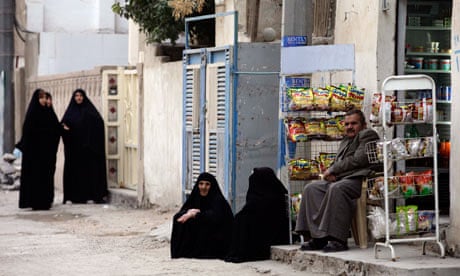Sunni Muslims in Iraq are being locked out of key jobs in universities and government, the Associated Press reported last week – adding that Shia banners can now be seen everywhere in Baghdad.
"Now that US forces are gone, Iraq's ruling Shiites are moving quickly to keep the two Muslim sects separate – and unequal."
While it is true, as the article states, that formerly mixed neighbourhoods of Baghdad, such as Hurriyah, have become predominantly Shia, it is a mistake to portray this as a result of the American withdrawal or to blame any particular party or sect. It is a remnant of the civil war that plagued the country and has nothing to do with the current government's domestic policy.
In reality, Iraq's Shia and Sunni elite, along with the Kurds and other groups, agreed to form a coalition government based on ethno-sectarian quotas. The result was Lebanese-style confessionalism. It was a collective decision by power-seeking politicians on all sides.
While the Associated Press report talks about Shia domination in some areas, it fails to mention that the reverse also applies: previously mixed areas, such as Ghazaliya, Doura and Ameriya are now Sunni-dominated.
The really disappointing aspect of this article is that it touches on a genuine problem – sectarian marginalisation in Iraqi society – yet it reads like scaremongering.
The article even quotes Grand Ayatollah Sistani, Iraq's most prominent Shia cleric, as saying "one Shiite from Baghdad is worth five Shiites like me from Najaf" and "you are the majority and your enemies are trying to reduce your numbers".
The quote is attributed to an anonymous group of men who allegedly met him in November last year, but it is grossly uncharacteristic of Sistani, a man who carefully measures each and every word. Sistani has been consistently cautious in his political stances in Iraq, especially when it comes to sectarian tensions.
During the height of the civil war, for example, Sistani told Shia Iraqis that the Sunnis are "ourselves, not [only] our brothers" in attempt to pacify angry groups who wanted nothing but revenge.
Had Sistani merely kept silent when Shia tribes asked him for permission to march north and "cleanse" Iraq, the country would look very different today. Whole cities, not just neighbourhoods, would have been ethnically cleansed. Sistani rejected outright their proposal and urged everyone to calm down.
The article also says: "Sunnis have long maintained that Shiite authorities use Baath ties as an excuse to purge the civil service and academic institutions of members of their community." This is true, but the article doesn't mention that the de-Baathification policy has been used against Shia Baathists too. Nor does it explain that many of these academics had been given their jobs precisely because of their political ties during Saddam's reign.
In Iraq, such appointments have long been politicised and the current government's policy (which I am not seeking to justify here) is merely a continuation of US post-invasion "peacemaking" policy. The Coalition Provisional Authority established Iraq's de-Baathification law in the summer of 2003.
It's worrying to find one of the world's major news agencies giving such an unbalanced picture of post-US Iraq. At one point it even portrays the Americans as the "protectors" of Sunnis in Iraq. I wonder if the people of Fallujah would agree about that.
There is certainly a need for sectarianism in Iraq to be reported and investigated – and I have written about it myself in the past. But it doesn't help anyone's understanding of the situation when western news agencies get caught up in sensationalist mudslinging.
